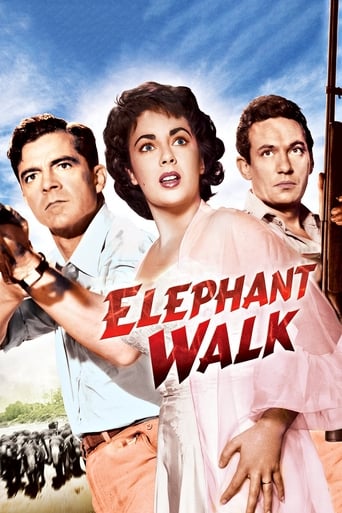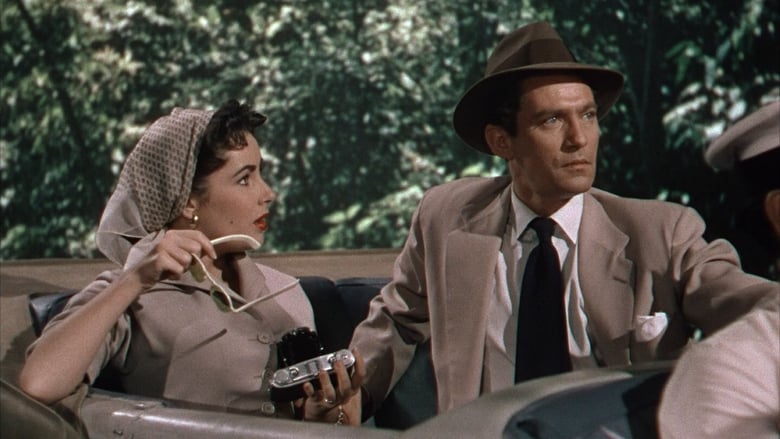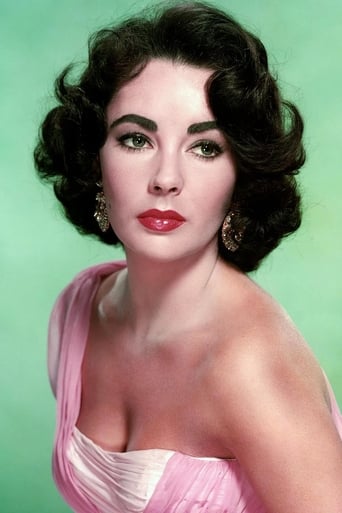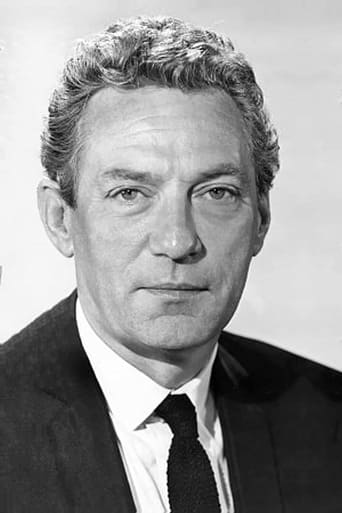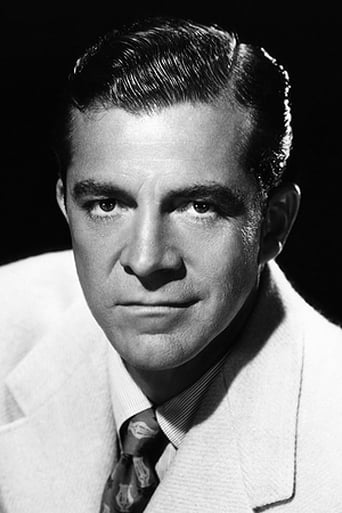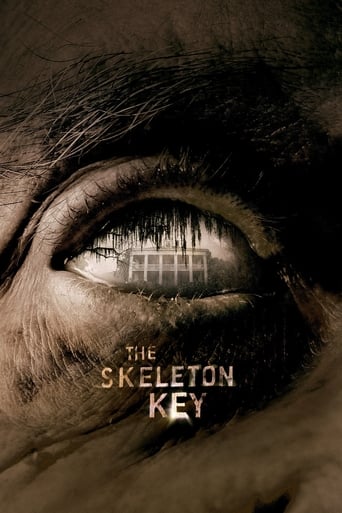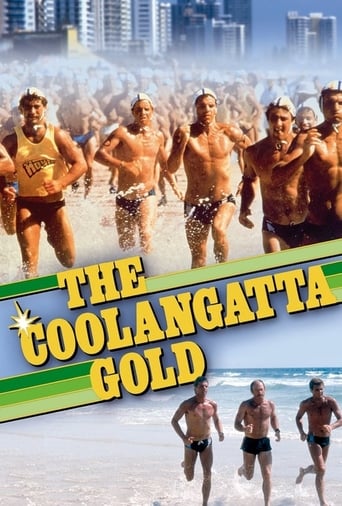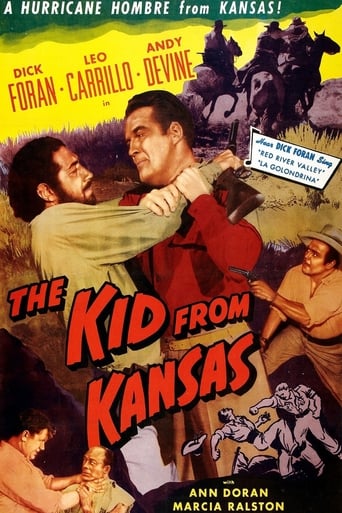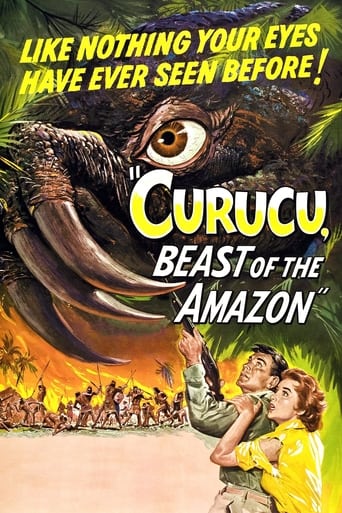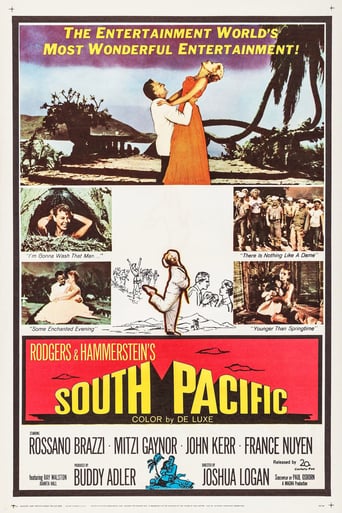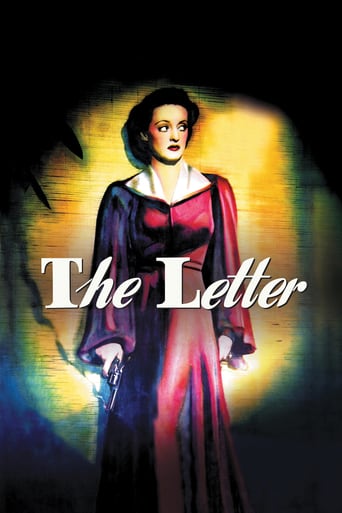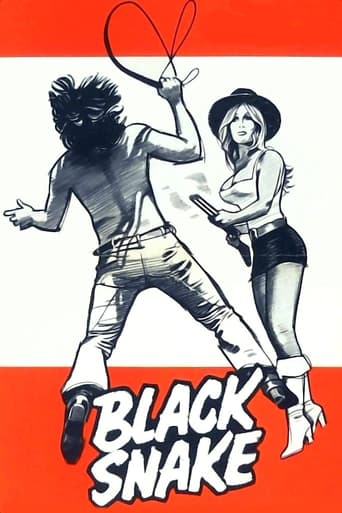Elephant Walk (1954)
Colonial tea planter John Wiley (Peter Finch), visiting England at the end of World War II, wins and weds lovely English rose Ruth (Dame Elizabeth Taylor) and takes her home to Elephant Walk, Ceylon, where the local elephants have a grudge against the plantation. Ruth's delight with the tropical wealth and luxury of her new home is tempered by isolation as the only white woman in the district; her husband's occasional imperious arrogance; a mutual physical attraction with plantation manager Dick Carver (Dana Andrews), and the hovering, ominous menace of the hostile elephants.
Watch Trailer
Cast


Similar titles
Reviews
"Elephant Walk" has pretty scenery, nice Technicolor photography, opulent sets, a luscious Liz, but a tedious (non-) story and an uninspring romance. The entire film is almost fast-forward-worthy until the last 6 minutes, a spectacular elephant stampede where nature justifiably punishes human vanity and stupidity. ** out of 4.
I'm not a particular fan of Elizabeth Taylor, although that's not to say I didn't like her performances. And, in my view, it was the first half of the 1950s (when this film was made) in which she did her most pleasing work. I have to say that at this point in her life, she was extremely beautiful.One of the interesting things about this film is that it originally starred Vivien Leigh, who had to drop out due to her bi-polar disorder. Taylor was a substitute, and I think a very good one. Some scenes, although not the ones with Taylor, were filmed in Sri Lanka. When the film was mostly re-shot with Taylor, her segments were filmed in Hollywood. There are a few scenes where, from a distance, you can see Vivian Leigh...particularly the beginning of the scene at the Buddhist temple. Some of the on-location scenes are quite stunning, and you get a glimpse of a real tea plantation.Peter Finch is very good in this film. You're not supposed to like him too much, and he played that just right. Taylor is exquisite. Perhaps better than Finch's role is that of Dana Andrews (who completes the triangle); Andrews is a much underrated actor, possibly due to problems with alcohol.I like this story -- a marriage between two people who have lived very different lives, and then the jungle and another man come in between them. My only criticism is the scene where the elephants tear down and set fire to the mansion...not as convincing as the rest of the film. But this is definitely worth a watch, although it may not end up on your DVD shelf. The print shown on TCM is nicely restored.
It's a familiar template. An ordinary girl is swept off her feet by a millionaire who takes her to his exotic home where some sort of dread secret spell seems to prevail. Will the spell be broken and will the young girl finally win the love of her man? Did Joan Fontaine in "Rebecca"? Did Joan Fontaine in "Jane Eyre"? Did Eleanor Parker in "The Naked Jungle"? Don't they all? This particular mansion happens to be in Ceylon. It was built by the father of Peter Finch, who carved a plantation out of the wilderness, and it's Dad's spirit that hangs heavily over the sprawling joint. He must have been quite a man. The name of the plantation is Elephant Walk and the old chap deliberately built it across the path the local elephants must take to their watering hole when the rains fail.The rains fail.Of course, before the big destructive climax there must be domestic problems. Peter Finch loves his wife, Elizabeth Taylor. Who wouldn't? With her white dress, raven hair, and violet eyes, she's perfection in her innocent salacity. But Finch turns a bit gloomy now and then, as if channeling his father, and weekends turn into drunken parties with polo being played on bicycles, a tradition left over from Dad's day. And like all new wives, what Liz Taylor wants to do is clean house and get rid of all of her husband's old friends.Dana Andrews is the second male lead. He's there so that when she's at her wit's end, Taylor can consider running off with him to Paris. There is an elaborate dance with colorful native costumes to celebrate Finch's birthday. There is always an elaborate dance with colorful native costumes in these movies. The natives are superstitious (they're Theravada Buddhists) and easily frightened. They run away at the first sign of danger from cholera and they keep out of the way when crazed elephants are on the march -- all but the faithful Mammy, I mean Appuhamy, who shouts and waves his arms at the elephants -- "Go back! Go back!," even as they mow down the wall and destroy furniture deliberately like the Vandals they are. Appuhamy actually runs up and tries to push one of the elephants away from the mansion. He shouldn't have done that.It all ends happily with Manderley, I mean Elephant Walk, burning to the ground and the Old Master's domineering spirit with it. At one point, Andrews suggests to Taylor that they retire to the "bungalow." That's a Hindi word that English borrowed, along with a number of others like "jungle", "loot," "thug," and "khaki." They never did make it to the bungalow but I'm beginning to envy Dana Andrews. He got to smooch up the delicious Gene Tierney in "Laura" and now the unimpeachably nubile Liz Taylor. What makes HIM so hot?
ELEPHANT WALK may not be the acme of literature or of film, but it is great entertainment in the quasi-melodramatic mode. It is the story of love, both genuine and illicit, as well as overweening ambition, devotion, and the arrogance of personal tyranny. A previous reviewer, John Mankin, questions why the central focus of the film, the mansion called Elephant Walk, should have been built by the former owner, the "governor" the late Tom Wiley, right across the elephants' traditional path to the major source of water, the river. To miss this point is to essentially miss the point of the whole center of the film: the hubris of man. That his son, played by Peter Finch, should become enthralled by the super image and enigma of his revered father, is not unexpected, since the son was without a mother growing up in a foreign jungle with only his father and his father's rowdy 'boys' club' as his role models. The point of the father was that he was a self-made man who would tame nature to his liking, and that liking was not just a tea plantation upon the lands the elephants once dominated, but also that he would dominate even the large bull elephant that led the herd, and thus he would dominate his son and all around him, and so we join the tale after the elephants have been denied the crucial dry season access to their pathway to water. Who could know that this dry season would last so long and what the elephants would do in desperation to get water? This is the nexus of the film: what will animals do to get water; what will humans do to get power or love? Ceylon, today's Sri Lanka, is the huge island off the coast of India where the plantation is located and one quickly learns that it is the real scenery of the story, not just the expenses of Miss Taylor. Were it not for this exotic location (much of the film was shot in Ceylon), and the magnificent "bungalow" this would have been just another potboiler. One must recognize the atmosphere created here as integral to the time and place, as it illuminates the latter day wealth and power attained by the English immigrant 'conquerors' that were part and parcel of the British raj. It is only such wealth gained by the use of virtual slave labor that one could build so magnificent a residence of ebony, teak, and marble. Not to be overlooked are the wonderfully carved Jalees (grille work window and doorway borders) evidently specified by art directors J. McMillan Johnson and Hal Pereira and obviously made by the cheaper labor on the island. Such craftsmanship reveals the careful attention to detail that these men sought.For those immune to the blandishments of time, place, and architecture, there is always the allure of Miss Taylor, as she marries a man she doesn't really know and is tacitly wooed by a another man, against the background described, and under the overarching tyranny of the legacy of a man deceased. As I said, it is not great literature nor even great film, but it is great spectacle long before that term was debased by the special effects extravaganzas of today.This is one of those films made to be seen on the giant screen of an outdoor drive-in, not on the home TV, so arrange the largest screen to see it on to fully appreciate its fine camera-work and scope.

